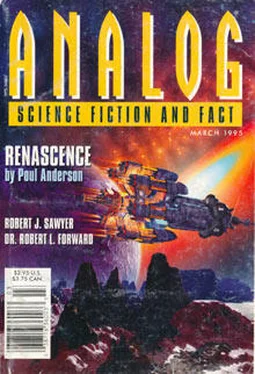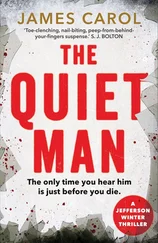James Gunn - The Gingerbread Man
Здесь есть возможность читать онлайн «James Gunn - The Gingerbread Man» весь текст электронной книги совершенно бесплатно (целиком полную версию без сокращений). В некоторых случаях можно слушать аудио, скачать через торрент в формате fb2 и присутствует краткое содержание. Год выпуска: 1995, Издательство: Dell Magazines, Жанр: Фантастика и фэнтези, на английском языке. Описание произведения, (предисловие) а так же отзывы посетителей доступны на портале библиотеки ЛибКат.
- Название:The Gingerbread Man
- Автор:
- Издательство:Dell Magazines
- Жанр:
- Год:1995
- ISBN:нет данных
- Рейтинг книги:5 / 5. Голосов: 1
-
Избранное:Добавить в избранное
- Отзывы:
-
Ваша оценка:
- 100
- 1
- 2
- 3
- 4
- 5
The Gingerbread Man: краткое содержание, описание и аннотация
Предлагаем к чтению аннотацию, описание, краткое содержание или предисловие (зависит от того, что написал сам автор книги «The Gingerbread Man»). Если вы не нашли необходимую информацию о книге — напишите в комментариях, мы постараемся отыскать её.
The Gingerbread Man — читать онлайн бесплатно полную книгу (весь текст) целиком
Ниже представлен текст книги, разбитый по страницам. Система сохранения места последней прочитанной страницы, позволяет с удобством читать онлайн бесплатно книгу «The Gingerbread Man», без необходимости каждый раз заново искать на чём Вы остановились. Поставьте закладку, и сможете в любой момент перейти на страницу, на которой закончили чтение.
Интервал:
Закладка:
The Gingerbread Man
by James Gunn

Illustration by George M. Krauter
Andrew Martin began his transformation on July 4, 2076. It might not have happened at all had he not been interrogating himself about the purpose of life. “The purpose of life,” he muttered, looking deep within, “is to avoid pain.”
But he was thinking of the pain inflicted upon the psyche by other people and how it would be better not to care what they said or did, or, indeed, to have anything to do with them. In any case, it started, as most things do in life, by accident. In fact, it was the rarest of rarities, an automobile accident. With automated roads and computerized controls, a car could collide with another, or with a stationary object, only by total malfunction, and even malfunctions were programmed to fail-safe. In Andrew’s case, however, a computer chip failed at a critical junction, short-circuiting the steering mechanism and the fail-safe devices, and allowed his vehicle to propel itself into and under the back of a computer-driven semi.
Although the airbag seized him in a lover’s embrace, it could not totally protect his legs, and his left foot was mangled beyond repair. Having failed at its most important task, the automobile’s computer sensed Andrew’s physical condition with instant accuracy and tightened a cuff around his lower leg, injected him with a painkiller and a tranquilizer, and summoned an ambulance, which arrived with whumping blades even before the tourniquet needed loosening.
Andrew opened his eyes to the sterile blankness of a hospital ceiling.
On the left wall was a window opening on a sunny meadow strewn with red, yellow, and blue wildflowers. A brook babbled through it. Behind the meadow was a green forest rising in the distance to blue mountain peaks capped with snow.
“What’s going on?” Andrew asked. “You’re in regional hospital five seven two,” the computer responded in a pleasant, concerned female voice. “You have been involved in an automobile accident—”
“An automobile accident!” Andrew interjected.
“An automobile accident,” the computer repeated. “Your left foot was crushed. We have replaced it with prosthetic model eff two one eight three. Can you move the toes on your left foot?”
It certainly felt as if he could move the toes on his left foot. Andrew pulled his left leg from under the light thermal covering and held it up for inspection. The leg above the ankle revealed a bit of bruising, but otherwise the leg, including the foot, didn’t look any different, and he certainly could move his toes, and without pain. “Are you sure it’s the left foot?”
“We do not make mistakes,” the computer said pleasantly. “Can you stand on the replacement?”
Andrew swung his legs over the side of the bed and stood on the warm resilient floor beside it. He felt a bit of residual soreness in the calf of his left leg and a bit of stiffness in his back and neck, but his left foot felt fine. In fact, it felt better than fine. He not only had a sharper sense of the temperature of the floor with his left foot than his right, he could feel the small depressions his heel and the ball of his foot and his toes made in the floor covering. In addition he had a feeling of well being in his foot to which he was not accustomed, like power waiting to be unleashed. He rose on his toes and felt a moment of shame that his right foot did not do as well.
“I see that the foot is working,” the computer said.
“Indeed,” Andrew said.
“Then we have an inquiry about your condition if you are prepared to receive it.”
“Who has made the inquiry?” Andrew asked, wondering if it was Jennifer and hoping, perhaps, that it was. But Jennifer had said she never wanted to see him again, and it was from that dismissal he had been fleeing when the accident had occurred, almost as if the computer chip had shared the disorder in his brain.
“A Mrs. Martin,” the computer replied.
“But I’m not married,” Andrew said.
“She has been identified as your biological mother.”
“I will accept the inquiry, of course,” Andrew said, although he wondered why his mother had gotten in touch with him now, after twenty years. It wasn’t as if they had argued, as he had with Jennifer; they had simply grown apart gradually until they had nothing left to share.
The square on the left wall that had been functioning as a window turned into the face of a woman who looked as young as Jennifer. He compared it with the memory of his mother that still was stored there, but he would never have recognized her.
“Mother,” Andrew said, “you have had your face redone.”
“Do you like it?” she said, brightening. “Well, it’s you I’ve called about. I was notified of your accident. Imagine having an accident on the highway! Imagine traveling on the highway! Andrew, I can’t imagine what got into you! Well, I can’t tell you how surprised I was after all these years to be notified that my son, my only son, had been injured. Well, I see you’ve quite recovered.” Her image began to fade into the sunny landscape.
“They replaced my foot, Mother,” Andrew said quickly.
His mother’s image steadied. “How efficient of them,” she said. “Well, if you need anything—”
“And, Mother,” Andrew said before she could fade again, “It works so well that I have decided to have the other one replaced as well.” He hadn’t known he was going to do it until he spoke, but now that the words were out he knew it was what he wanted to do. He could not go through life limping on a less-than-perfect real foot.
A day later Andrew walked out of regional hospital 572. It was located at the intersection of two major highways surrounded by growing crops clear to the horizon. No one else was in sight. It was a virtually silent and efficient scene in which vehicles of various sizes and purposes, but only a single, silvery color, traveled on either side, moving rapidly in several directions and effortlessly maintaining the same distance from the others. None of them was occupied; none of them, indeed, had any windows. He could understand his mother’s surprise. He shared it.
He stepped into the waiting taxi and allowed it to whisk him to his home, and when it lowered him onto the landing pad of his apartment building twenty minutes later, he made his way quickly to the elevator and then to his rooms. There were four of them: a bedroom, a living room, a bathroom, and a dining room. With computer service, who needed more? They were decorated according to his own taste for comfort and muted colors, but with easy-to-clean surfaces. He would have liked to have commented to someone about his new vitality, but he had met no one. As soon as he had settled himself into his favorite chair, he called Jennifer.
“I will accept your call this time,” Jennifer’s image said frostily, “since I have been notified that you have been involved in an accident. But my earlier statement still holds.”
“You don’t understand,” Andrew said. “I feel as if I have wings on my feet, and I’d like to dance. You have criticized my remoteness, my lack of involvement, and I wanted you to know that I feel like getting involved. I want to dance.”
“Well—” she said.
They met at a neutral site, at a studio where dancers performed for a television audience. But it was little used any more. Computers could construct new performances from previously recorded routines, Fred Astaire and Margot Fonteyn, say, or Rudolf Nureyev with Isadora Duncan. So Andrew and Jennifer had the studio all to themselves. “Play something fast,” Andrew said to the computer while he removed his shoes to allow his new feet more freedom. They began to dance.
Читать дальшеИнтервал:
Закладка:
Похожие книги на «The Gingerbread Man»
Представляем Вашему вниманию похожие книги на «The Gingerbread Man» списком для выбора. Мы отобрали схожую по названию и смыслу литературу в надежде предоставить читателям больше вариантов отыскать новые, интересные, ещё непрочитанные произведения.
Обсуждение, отзывы о книге «The Gingerbread Man» и просто собственные мнения читателей. Оставьте ваши комментарии, напишите, что Вы думаете о произведении, его смысле или главных героях. Укажите что конкретно понравилось, а что нет, и почему Вы так считаете.












